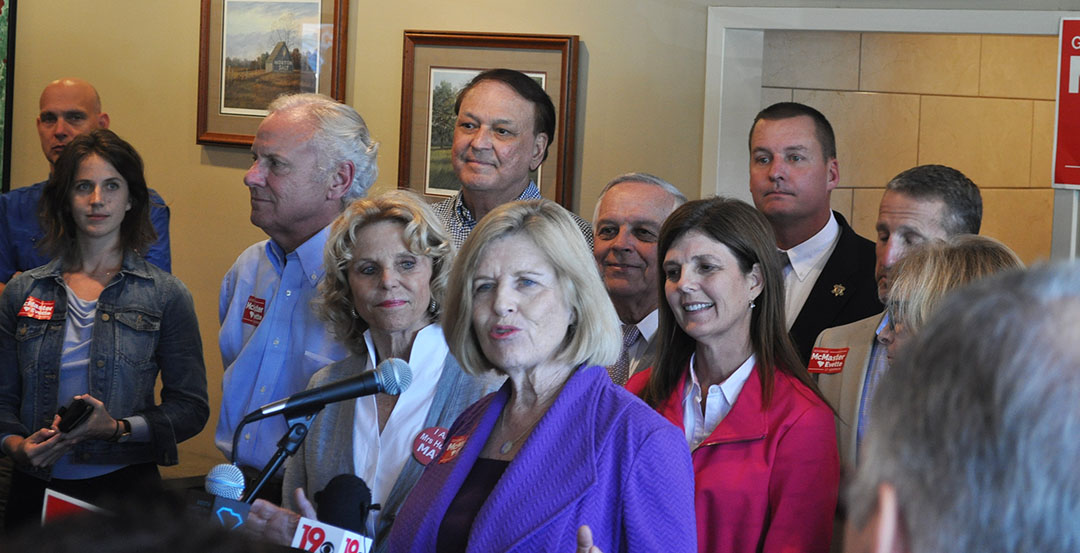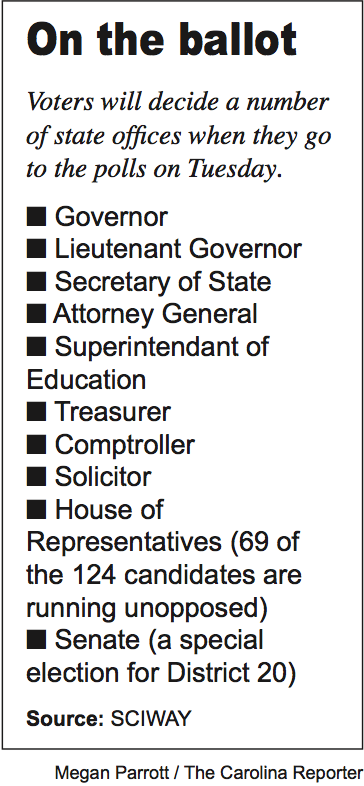Molly Spearman, the current Superintendent of Education, is running unopposed in the upcoming election. On Wednesday she attended the bus tour kickoff event for Gov. Henry McMaster. Credit: T. Michael Boddie
When voters go to the polls Tuesday, they may be electing the last state Superintendent of Education.
Earlier this year, the state Legislature decided that it was time to place a constitutional amendment on the ballot to determine if the head of the Department of Education will continue to be elected or, in the future, be appointed by the governor.
“It took a very long time; it’s been debated for about 60 years to actually even put it on the ballot,” said Ryan Brown, chief communications officer for the S.C. Department of Education. “To pass it in the General Assembly, it takes a 2/3 vote by both the House and Senate. It’s on the ballot which is a good thing.”
The current superintendent, Molly Spearman, who is running unopposed for a second term, believes the change will place more qualified people into the position. The change will take place in 2023.
“It sets qualifications for holding the office. Currently there is not a single qualification. If you’re a South Carolina resident and 18 years of age, you can run and be the state superintendent,” said Brown. “The qualifications that it [the amendment] requires now are minimum of a master’s degree in either education or business, and extensive experience in working in a school or school district or in business, working with budgets, taxes and that kind of background.”
The governor would be directly accountable for education and prospective candidates will not have to raise money in order to run a campaign, Spearman believes.
“We ultimately believe that this will be a system that better serves students and that’s what it’s all about,” said Brown.
For former state Superintendent Inez Tenenbaum, this amendment has little to do with the power of the governor and more about putting education in the forefront of government.
“If you look at the agencies in the Governor’s cabinet, they are just as large and complex as the Department of Education and no one has a problem with those positions being appointed,” said Tenenbaum. “I do think that the Department of Education ought to be in the governor’s cabinet; it makes the governor accountable for education. Without it being in the governor’s cabinet, some governors don’t spend any time on education and initiatives.”
“It’s not about power, it’s about responsibility.”
What does the amendment say?
Amendment 1
Must Section 7, Article VI of the Constitution of this State, relating to state constitutional officers, be amended so as to provide that beginning in January 2023, or upon a vacancy in the office of Superintendent of Education after the date of the ratification of the provisions of this paragraph, whichever occurs first, the Superintendent of Education must be appointed by the Governor, with the advice and consent of the Senate; to provide that the appointed Superintendent of Education shall serve at the pleasure of the Governor; and to require the General Assembly to provide by law for the duties, compensation, and qualifications for the office?
A ’Yes’ vote: will require the Superintendent of Education be appointed by the Governor with the consent of the Senate.
A ‘No’ vote: maintains the current method of electing a Superintendent of Education.
Arguments
Yes
- S.C. is one of only 8 states that still elect their Superintendent of Education.
- Many of the statewide offices are appointed positions.
- An appointed Superintendent would make the Governor more responsible for education.
- Qualified candidates may be discouraged from running for the elected position due to time commitment, money, and politics.
No
- An elected Superintendent is directly accountable to voters regarding education.
- The largest portion of state funding (and federal grants) goes towards education and as an elected official can give their full attention to education without being distracted by other state issues.
- Special interest lobbying might influence gubernatorial appointment to the position.
- Through campaigns, voters are given the chance to meet and evaluate the candidates.
Breakdown information provided by SCIWAY and the League of Women Voters.






